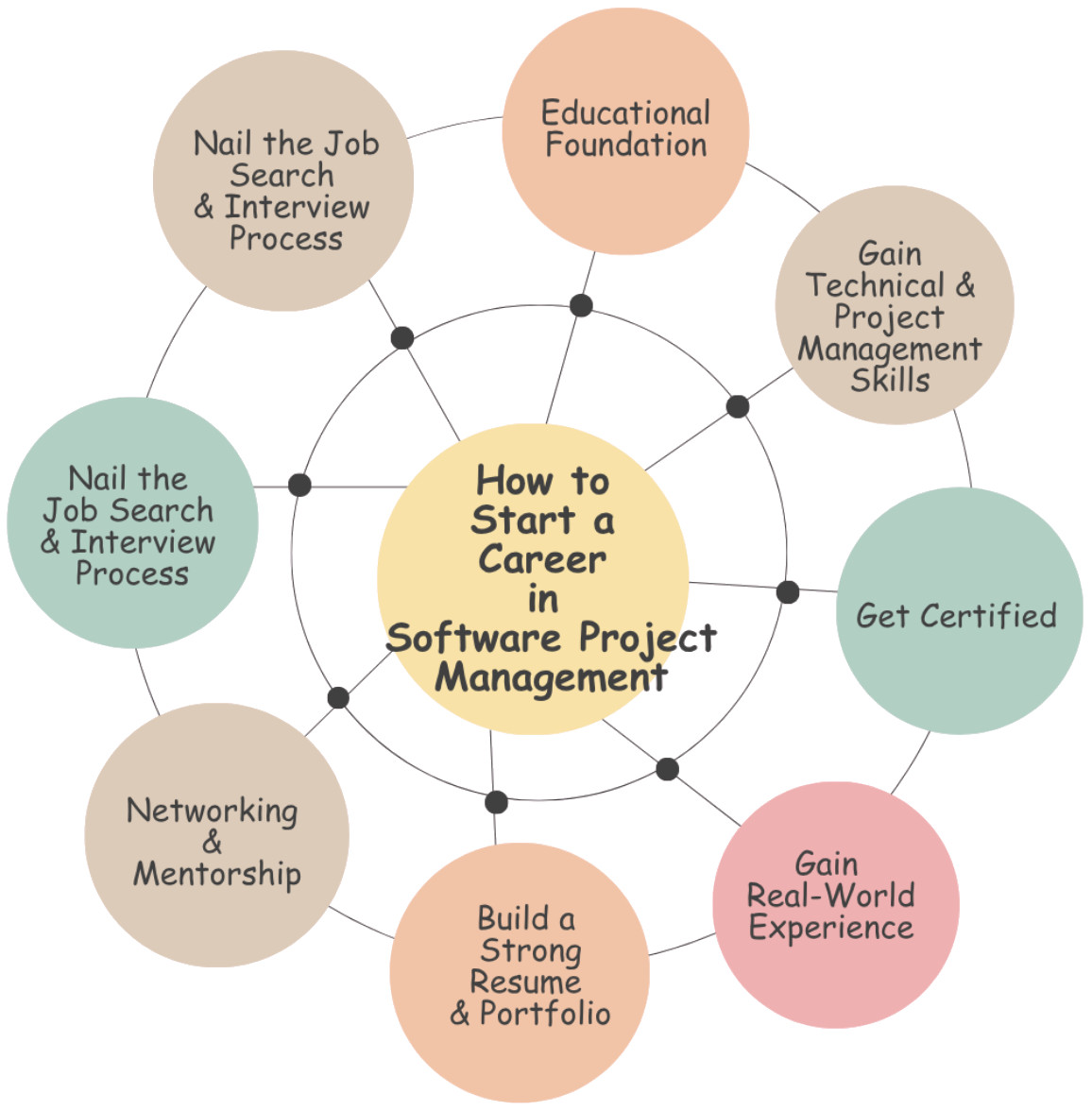How to Start a Career in Software Project Management
|
|
One of the cornerstones of successful digital product development in today’s technology world is software project management. It is integral to software design and development. From balancing scope, time, and resources in a project to ensuring deliverables are on track, the software project manager (SPM) plays a crucial role in aligning business goals with software development and execution. A SPM plays an essential role throughout all phases of the software development life cycle (SDLC) from planning to client delivery.
More complex projects require more professional management skills and hence SPM enjoys a high global demand. If you are interested in software project management, leading projects, and being the bridge between business stakeholders and technical team, a career in software project management might be the right choice for you.
| Key Takeaways: |
|---|
|
This article will serve as a guide for you to begin your career in software project management. It will also explain the key responsibilities, education and training required, and perks associated with the SPM career.
What is Software Project Management?
Software project management is a process that involves planning, executing, monitoring, and wrapping up software development projects. It involves managing teams, budgets, tools, communication, schedules, risks, and stakeholder expectations. Software project management is the logistical process that supervises and leads a software project through the development lifecycle.
An SPM is the person who ensures the project stays on schedule and budget and that the team completes it within a given timeframe. An SPM also ensures that the project meets the quality standards and business requirements.
Software Project Manager: Key Responsibilities
An SPM has the following key responsibilities:
- Helping teams oversee software projects with a unique production cycle.
- Defining project scope and goals. SPM is also responsible for delegating responsibilities and various intermediate milestones for the project.
- Creating and managing timelines and budgets for the project. Also, see that the project does not exceed the budget.
- Coordinating cross-functional teams, supporting team members when problems arise, and resolving conflicts.
- Identifying and mitigating risks related to the project so that the project remains on schedule and within the budget.
- Communicating with stakeholders, including clients, leadership, and team members.
- Managing various project-related tools like Jira, Trello, or Asana, and staying current with new software tools and project management techniques.
- Helping with testing, customer feedback, and ongoing product updates.
- Ensuring documentation and compliance with appropriate standards.
Evaluate if it’s the Right Career for You
Here are the skills required for an SPM:
Core Aptitudes
- Strong organizational and leadership abilities.
- Excellent communication and negotiation skills.
- Basic understanding of software development processes, including SDLC.
- Conflict resolution and problem-solving mindset
- Ability to multitask and work under pressure.
Passion Alignment
Also, evaluate if you have the passion to be an SPM. Ask yourself the following questions:
- Do I enjoy leading teams?
- Am I comfortable handling ambiguity and conflicts?
- Can I translate technical information for business leaders and vice versa?
You’re likely well-suited to this field if your answers are mostly yes.
Start a Career in Software Project Management
To start a software project management career or to be an SPM, you should focus on gaining relevant education, experience, and certifications. Also, developing essential project management skills like communication, leadership, and technical proficiency. Here is the detailed breakdown of how to start a career in software project management:

Educational Foundations
For a professional to scale to an SPM position, he/she should have the following educational background. While not mandatory, a bachelor’s degree in one of the following fields is often a strong foundation for an SPM:
- Computer Science
- Information Technology
- Software Engineering
- Business Administration
Although a technical degree is not mandatory, a prospective SPM candidate must understand software well. You can supplement your education with one or more of the following courses:
- Agile Methodologies (Scrum or Kanban). Read: Scrum vs. Kanban vs. Lean
- Software Development Lifecycle (SDLC)
- UX/UI basics
- Data structures and algorithms (foundational understanding)
- Database concepts and version control systems
Gain Technical and Project Management Skills
As an SPM, you don’t need to code extensively, but familiarity with programming languages (e.g., Java, Python, JavaScript), frameworks, APIs, and deployment practices will help you lead better. Here are some of the platforms that offer various courses:
- Coursera
- edX
- Codecademy
- Udemy
These websites offer courses at reasonable prices. Some of them offer free courses as well.
Project Management Tools: Master one or more tools you’ll use every day.
- Task Management: Jira, Trello, ClickUp, Asana
- Communication: Slack, Microsoft Teams
- Documentation: Confluence, Notion, Google Docs
- Version Control: Git, GitHub
- Roadmapping: Aha!, ProductPlan
Methodologies & Frameworks: Understand core project management frameworks.
- Agile: Scrum, Kanban, SAFe
- Waterfall: Structured, phase-based model. Read: Waterfall Project Management Methodology
- Lean Development
- DevOps and Continuous Integration/Continuous Deployment (CI/CD) principles
Get Certified
As an SPM, certifications boost your knowledge and strengthen your resume. Here are some valuable certifications:
Entry-Level
- Certified Associate in Project Management (CAPM) – PMI
- Scrum Master Certification (CSM) – Scrum Alliance
Mid-to-Advanced
- Project Management Professional (PMP) – PMI
- Professional Scrum Master (PSM I/II/III) – Scrum.org
- Agile Certified Practitioner (PMI-ACP)
For Technical Fluency
- ITIL Foundation – Best practices in IT service management
- DevOps Foundation Certification
Gain Real-World Experience
Working in various positions exposes you to project dynamics. Here are some entry-level roles that lead to SPM:
- Business Analyst
- QA Tester or QA Lead
- Product Coordinator
- Junior Project Manager
- Agile Coach Assistant
- Scrum Master
These roles provide opportunities to observe step-by-step project execution. Learn from experienced managers, and gradually take on more responsibilities.
Internships and Volunteering: Internships at tech companies can provide you with hands-on experience. You can even volunteer to manage tech-related projects for nonprofits, student groups, or open-source software teams. Pay more attention to:
- Managing deadlines and deliverables
- Facilitating team communication
- Tracking metrics and status reporting
Build a Strong Resume and Portfolio
Showcase Your Project Work: Even non-commercial projects count! Include the following in your resume:
- School or bootcamp group projects
- GitHub repositories with collaboration and version control
- Volunteer projects where you led a team or handled logistics, including schedules and deadlines
- Documentation you’ve created (requirements, test plans, retrospectives, presentations)
Remember, even minute information counts.
Resume Tips:
- Focus on results: e.g., “Managed 3-week sprint delivering 90% of committed features”
- Emphasize the tools and methodologies used
- Tailor the resume to the job descriptions using keywords
Networking and Mentorship
Networking is a key to success! Grow your professional network and connect with software professionals globally
- LinkedIn groups: “Agile Project Management”, “Scrum Masters”, etc.
- Reddit: r/projectmanagement, r/agile, r/cscareerquestions
- Slack & Discord communities focused on tech management
- PMI Chapters: Attend local meetups and webinars
Professional communities and forums help you network and keep you aware of the latest happenings in the industry.
Find a Mentor: Having an experienced project management professional as a mentor helps you:
- Decode real-world challenges
- Prepare for interviews
- Suggest practical learning paths
- Connect with opportunities
You can find mentors on these platforms: LinkedIn, ADPList, your alumni network, or internal company programs.
Nail the Job Search and Interview Process
When you are confident of your skills and experience for the SPM job, start your job search and nail the interview process.
Where to Apply:
- Job boards: LinkedIn, Indeed, Hired
- Tech-specific: BuiltIn, Stack Overflow Jobs, AngelList (startups)
- Internal promotions if you already work in a tech firm
You can also look for referrals through your friends and professional contacts.
Tailor Applications: Every job post is different. Customize your resume to reflect the exact tools, methods, and skills the job listing emphasizes, and align your application to the job description provided.
Interview Prep: Typical topics for SPM interview are:
- Describe a time you resolved a team conflict.
- How do you prioritize when deadlines overlap?
- How do you run sprint planning or retrospectives?
- What’s your process for risk management?
You may be asked to:
- Draw a Gantt chart or Kanban board
- Create a risk mitigation plan
- Respond to scenarios involving scope creep or developer bottlenecks
Continuous Learning and Growth
An SPM must learn continuously and stay updated with the latest developments and innovations. Here are some options to do that:
- Subscribe to blogs: Atlassian, Mountain Goat Software, PMI
- Listen to podcasts: The Agile Coach, Project Management Podcast
- Follow thought leaders on LinkedIn
Apart from continuous learning, here are some tips to excel in your role.
Learn from Mistakes: In your initial days as an SPM, you might make some mistakes. Your first few projects may involve misestimations, missed deadlines, or miscommunications. Reflect, ask for feedback, and continuously adapt your approach by learning from your mistakes.
Consider Specialization: Once you’re established, consider specializing in one or more of the following:
- Agile Coaching
- Technical Program Management (TPM)
- Product Management (PM)
- Enterprise Project Management (EPMO)
Conclusion
A career in software project management is a rewarding journey for software professionals who thrive on leadership, collaboration, and structure. While the SPM job may initially seem overwhelming, breaking it down into manageable steps like learning, practicing, networking, and certifying makes it easier and leads you to success.
An SPM does not need to be the best coder or most experienced manager from day one. All it takes is the willingness to learn, take initiative, volunteer, and guide teams toward shared goals. Work diligently, and you will be well on your way to becoming a skilled software project manager.
| Achieve More Than 90% Test Automation | |
| Step by Step Walkthroughs and Help | |
| 14 Day Free Trial, Cancel Anytime |












